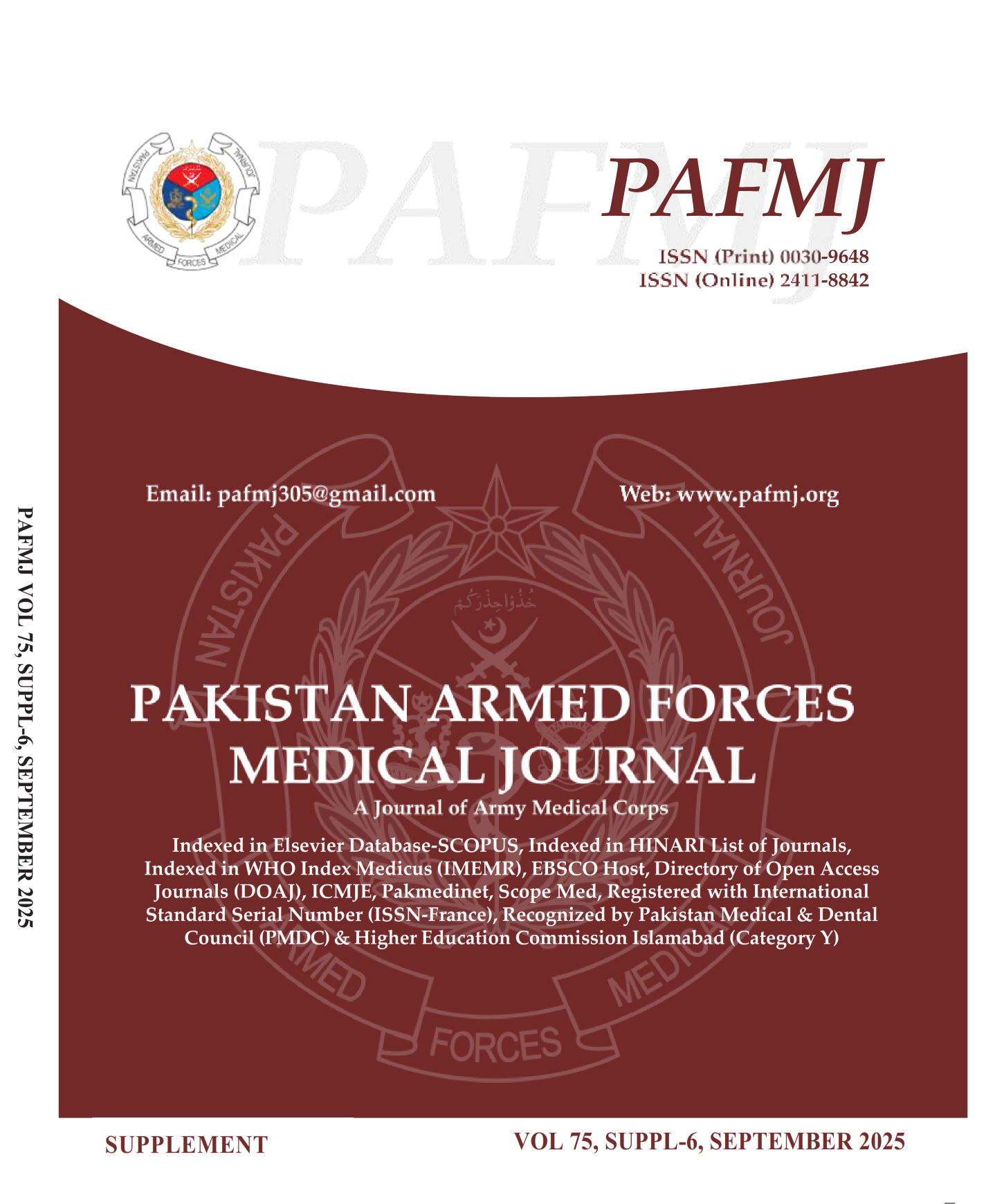Unlocking Potentials: Exploring Awareness, Utilization, and Perceptions related to Benefits and Challenges of Artificial Intelligence in Research - A Study amongst Aspiring Healthcare Professionals of Islamabad
DOI:
https://doi.org/10.51253/pafmj.v75iSUPPL-6.13519Keywords:
Artificial Intelligence, Awareness, Challenges, Research, Utilization.Abstract
Objective: To assess level of awareness, utilization pattern, and perceptions regarding benefits and challenges of artificial intelligence in research among aspiring healthcare professionals in Islamabad.
Study Design: Cross Sectional Analytical study
Place and Duration of Study: Foundation University School of Health Sciences (FUSH), Islamabad from 25th May to 25th September 2024
Methodology: A stratified random sample of 355 students was surveyed after ethical approval using structured Google Form. After informed consent, data were collected on demographics, AI awareness, utilization, benefits, challenges and training needs, and analyzed using SPSS v25. Chi-square, t-tests, correlation, and regression were applied (p ≤ 0.05).
Results: Of 355, 327 responded, among these, 236 (72.2%) were generally aware of AI in research, though 209 (88.5%) had no formal AI training. The mean awareness score 10.44±3.19, with 174 (73.7%) showing adequate awareness. However, only 75 (31.8%) showed sufficient AI tool utilization (mean score 6.4±4.29). Popular AI platforms included ChatGPT, Grammarly, and Mendeley. A majority (68.2%) agreed that AI improves research efficiency. Key barriers included lack of training (54.6%), limited technological access (46.2%), 93.6% expressed willingness to use AI in future research. Significant associations were found between awareness, utilization, and demographic variables.
Conclusion: Aspiring healthcare professionals in Islamabad showed high AI awareness but low utilization, with limited formal training. Positive perceptions prevailed despite concerns over plagiarism, data security, and technical understanding. Formal AI training remains essential for developing responsible, effective, and ethical use of AI in research
Downloads
References
1. Ahmad MN, Abdallah SA, Abbasi SA, Abdallah AM. Student perspectives on integration of artificial intelligence into healthcare services. J Med Internet Res 2023; 25: 20552076231174095. https://doi.org/10.1177/20552076231174095
2. Ahmad MN, et al. AI usage among medical students in Palestine: a cross-sectional study and demonstration of AI assisted research workflows. BMC Med Educ 2025; 25: 72.
https://doi.org/10.1186/s12909-025-07272-x
3. Gao CA, Howard FM, Markov NS, et al. Comparing scientific abstracts generated by ChatGPT to original abstracts using an artificial intelligence output detector, plagiarism detector, and blinded human reviewers. Lancet Digit Health 2023; 5(2): e105- https://doi.org/15. 10.1016/S2589-7500(23)00025-8
4. Zelinski C. Can artificial intelligence transform academic publishing? Learn Publ 2022; 35(3): 291-294.
https://doi.org/10.1002/leap.1466
5. Rimmer A. The impact of artificial intelligence on clinical education: perceptions of postgraduate trainee doctors in London. BMC Med Educ 2021; 21: 429.
https://doi.org/10.1186/s12909-021-02870-x
6. Lee J, Kim H, Kim SY. Medical students’ perceptions of artificial intelligence in medical education: a national survey in Korea. Korean J Med Educ 2021; 33(3): 175-183.
https://doi.org/10.3946/kjme.2021.202
7. Nasir A, et al. Awareness and attitude regarding artificial intelligence in health care among Pakistani doctors: a cross-sectional survey. Cureus 2023; 15(1): e34357.
https://doi.org/10.7759/cureus.34357
8. Imran M, et al. Perception and knowledge of AI in diagnostics among Pakistani health professionals: a national survey. Pak J Med Sci 2023; 39(2): 452-457.
https://doi.org/10.12669/pjms.39.2.6789
9. Aslam S, et al. The rise of ChatGPT: exploring its role, perceptions, and ethical challenges among medical students in Lahore. Pak J Public Health 2024; 14(1): 22-27.
https://doi.org/10.32413/pjph. v14i1.990
10. Khan H, Rehman F, Zia M. Integration of AI-based writing tools in undergraduate medical education: insights from Islamabad and Karachi. Pak J Educ Health Prof 2024; 13(2): 65-71. https://doi.org/10.4103/pjehp.pjehp_24_24
11. Asif S, Ali SM, Ali Z, et al. Artificial intelligence adoption in healthcare: a systematic literature review and future research directions. Health Inform J 2023; 29(1): 14604582231159460.
https://doi.org/10.1177/14604582231159460
12. Patel P, Johnston M. Ethical challenges in the use of artificial intelligence in healthcare. Healthc Manage Forum 2021; 34(6): 322-6.
https://doi.org/10.1177/08404704211034930
13. Yousif M, Ashraf H, Hassan T, et al. The impact of artificial intelligence on healthcare: a systematic literature review. Healthcare (Basel) 2022; 10(6): 1089.
https://doi.org/10.3390/healthcare10061089
14. Ahmad T, Nisar Q, Abbas A. Integrating AI in biomedical research: a Pakistani perspective. Bioinform Biol Insights 2023; 17: 11779322231170812.
https://doi.org/10.1177/11779322231170812
15. Shahid A, Latif R, Baig A. Faculty readiness for AI-based tools in medical research: a mixed-method study in Pakistan. Pak J Med Educ 2024; 8(1): 10-16.
https://doi.org/10.5455/pjme.2024.08101
16. Zubair M, Hassan T, Rana M. Understanding the ethical boundaries of AI in clinical research: voices from young medical professionals. Pak Bioeth J 2025; 9(2): 101-107.
https://doi.org/10.5439/pbj.2025.09201
17. Khan RA, Jawaid M. Use of artificial intelligence in academic writing: an ethical conundrum for medical journals. Pak J Med Sci 2023; 39(2): 265-267.
https://doi.org/10.12669/pjms.39.2.7916
18. Rizwan S, Moinuddin M, Munir N, et al. Artificial intelligence and medical education: knowledge, attitude, and practices among undergraduate medical students. Pak J Med Sci 2023; 39(3): 698-703. https://doi.org/10.12669/pjms.39.3.7593
19. Habib M, Khalid W, Fatima M, et al. Assessing medical students' knowledge and attitudes towards artificial intelligence in medicine: a cross-sectional survey from Pakistan. J Pak Med Assoc 2023; 73(5): 1027-31.
https://doi.org/10.47391/JPMA.7505
20. Almarri O, et al. Readiness to embrace artificial intelligence among medical students in Saudi Arabia: a national survey. Int J Environ Res Public Health 2025; 12: 2504.
https://doi.org/10.3390/ijerph12242504
21. Savage TR. Artificial intelligence in medical education. Acad Med 2021; 96(9): 1229-30.
Downloads
Published
License
Copyright (c) 2025 Tahira Amjad, Owais Mahmood Ikram, Murtaza Akif, Hafza Sajid, Rikza Sadiq

This work is licensed under a Creative Commons Attribution-NonCommercial 4.0 International License.















